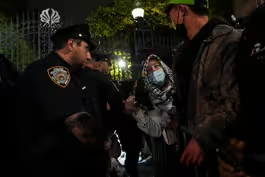
Gaza war impacts Israel's normalization with Saudi Arabia
Clip: 5/3/2024 | 7m 25sVideo has Closed Captions
Gaza war's impact on Israel's potential normalization with Saudi Arabia
President Biden has been forced to address the fallout from the war in Gaza on two fronts. In the United States, pro-Palestinian protests spread across college campuses this week. And abroad, the war remains central to the conversations surrounding what could be a historic security pact involving Saudi Arabia.
Problems playing video? | Closed Captioning Feedback
Problems playing video? | Closed Captioning Feedback
Major funding for “Washington Week with The Atlantic” is provided by Consumer Cellular, Otsuka, Kaiser Permanente, the Yuen Foundation, and the Corporation for Public Broadcasting.

Gaza war impacts Israel's normalization with Saudi Arabia
Clip: 5/3/2024 | 7m 25sVideo has Closed Captions
President Biden has been forced to address the fallout from the war in Gaza on two fronts. In the United States, pro-Palestinian protests spread across college campuses this week. And abroad, the war remains central to the conversations surrounding what could be a historic security pact involving Saudi Arabia.
Problems playing video? | Closed Captioning Feedback
How to Watch Washington Week with The Atlantic
Washington Week with The Atlantic is available to stream on pbs.org and the free PBS App, available on iPhone, Apple TV, Android TV, Android smartphones, Amazon Fire TV, Amazon Fire Tablet, Roku, Samsung Smart TV, and Vizio.
Buy Now

10 big stories Washington Week covered
Washington Week came on the air February 23, 1967. In the 50 years that followed, we covered a lot of history-making events. Read up on 10 of the biggest stories Washington Week covered in its first 50 years.Providing Support for PBS.org
Learn Moreabout PBS online sponsorshipSo, where does Saudi Arabia and where does normalization fit into this?
FRANKLIN FOER: Right.
So, if the administration is able to get to a point where there's a calm in the conflict, they're working towards a deal with Saudi Arabia that would allow for a bilateral defense agreement with the United States and paving the way for a normalization deal with Israel.
And that's going to happen simultaneous to another deal that's being brokered with the Arab countries to deal with postwar reconstruction of Gaza, who will govern the country, who will pay for the reconstruction of Gaza.
It's kind of a Rube Goldberg contraption of diplomacy, that they need to do something that calms things down now and then kind of shoots the moon in order to get to some sort of more permanency.
NANCY YOUSSEF: Can I just add to that?
You know what I think is interesting, though, they're trying to reach these normalization deals at a time when whatever happens, the region is different because of these wars.
So, I think these deals are being negotiated in an environment that is constantly shifting in ways that we don't fully understand.
JEFFREY GOLDBERG: Yes.
No, you can picture Blinken flying back and forth in these capitals, and you land in one, and the reality has changed entirely because of action somewhere else.
Asma, talk about the White House and their level of confidence that they're going to be able to pull this contraption off.
ASMA KHALID: Yes.
I mean, I've been struck by the fact that for months, I mean, frankly, even before that, I would say, going back even two years ago, I traveled with Biden to both Israel and Saudi Arabia.
And even at that time, they were really optimistic about this deal of so-called extending the Abraham Accords.
It's long been something that this White House wants to achieve and would see, I think, as a great success.
But I have I think a lot of skepticism about the ability to achieve this.
And I guess my primary question is, I don't know the answer to this, those of you who cover, I think, sort of national security might have a better idea of what is the incentive for MBS to really negotiate with the Biden administration -- JEFFREY GOLDBERG: MBS, Mohammed bin Salman, the crown prince of Saudi Arabia.
ASMA KHALID: Yes, of Saudi Arabia, over a potential, let's say, of a Donald Trump second term.
So, in my sense, I don't see what incentive there is to really negotiate a solid deal before November.
And, certainly, this administration would like to see a deal as soon as possible.
JEFFREY GOLDBERG: You mean the Saudis would much rather have a deal with Donald Trump?
ASMA KHALID: I think both the Saudis and Israelis you saw were very close to the former Trump administration, and who knows what the second term of a Trump administration would look like.
JEFFREY GOLDBERG: Wonderful pivot, wonderful pivot.
Wow, she's such a pro.
Eric, in your interviews with Donald Trump, he talked quite a bit and in a surprising way about Netanyahu, who, one could surmise over the last couple of months, was kind of looking forward to the possibility of a return of Donald Trump.
It turns out, Donald Trump doesn't seem to like Netanyahu very much.
Can you give us a sense of what Donald Trump told you?
ERIC CORTELLESSA: Yes, no, absolutely.
I mean, there's a clear bitterness between them, right?
Donald Trump, I mean, you could feel it in the room.
I asked Donald Trump when we spoke at Mar-a-Lago, do you think it's time for Netanyahu to go?
And his answer was, I had a bad experience with Bibi.
JEFFREY GOLDBERG: That was his literal answer.
ERIC CORTELLESSA: That was his answer.
We had a bad experience with Bibi.
And he mentioned the Operation Takeout Qassem Soleimani, a top Iranian general.
It was supposed to be a bilateral operation between Israel and the United States.
Bibi backed out at the last minute.
He cites that as the source of the tension.
Also, many have speculated that what really pissed him off was when Netanyahu congratulated Joe Biden for winning the election, that that was a bridge too far.
But right now, Donald Trump has said to me, look, I get along with Benny Gantz.
There are others in Israel I've worked with who could be good.
That was quite -- JEFFREY GOLDBERG: A member of the war cabinet, leads another party within the coalition.
ERIC CORTELLESSA: And so, I mean, just saying that he had a bad experience with Netanyahu and, you know, very, you know, pointedly blaming Netanyahu for allowing the October 7th massacre to happen on his watch and then saying that others could do the job well was a stinging rebuke in Netanyahu.
JEFFREY GOLDBERG: Wait.
Go into that a little bit more.
Trump is saying that Netanyahu is responsible for Israeli security and failed?
ERIC CORTELLESSA: Well, he told me that Netanyahu has been rightfully criticized for what happened on October 7th.
JEFFREY GOLDBERG: So, there was no warmth in the way he talked about Netanyahu at all?
ERIC CORTELLESSA: Not really, no.
JEFFREY GOLDBERG: Yes.
So, Frank, what does that mean for the relationship between Netanyahu and Biden?
It would seem that Netanyahu could read what he just reported and say, well, maybe I'd better make a deal with Biden because this guy is not my friend.
FRANKLIN FOER: I mean, Netanyahu, as you know better than -- he's a tactician whose goal is to survive until tomorrow.
I don't think his timeline extends to the next election.
He's worried about surviving a ceasefire deal.
He's worried about what's going to happen in Rafah.
He's worried that his promises of total victory, which he makes every day, are never going to come true.
And at some point, he's going to start to pay a price for the failures of October 7th, the failures of this campaign in Gaza to fully eradicate Hamas.
He's not thinking as far as November.
NANCY YOUSSEF: And if I could just add to that, President Biden has tied himself to Netanyahu.
He has really embraced Netanyahu.
His survival, politically, also is intertwined with Netanyahu's in the sense that he has said he's going to back him.
He's criticized him recently.
But he hasn't signaled that he's willing to, for example, not provide weapons or, in any way, put increased pressure on him to reach a deal faster than Netanyahu is ready.
He has said we don't support the Rafah operation.
But we haven't seen any strong pressure on the Netanyahu government to reach a deal or to curtail their ability to conduct these operations in terms of the weapons that they're provided from the United States.
JEFFREY GOLDBERG: Right.
Asma, a political question, how much, in your mind, do the campus protests and the continued uncertainties that we're talking about, how much is it actually hurting Joe Biden in polls today?
Because he's not doing that well in the polls today anyway.
ASMA KHALID: He's not doing that well in polls but for a variety of reasons, right?
I mean, I would argue that when you look at polls and voters consistently complain about high prices and inflation.
And I hear this all the time.
I was just recently out in Bethlehem, Pennsylvania area.
But at the same time, I think what's interesting in some polls is people also even talk about the border.
They talk about democracy, abortion, obviously, depending on where their partisan leanings are.
You know, I don't know.
I was just looking at an ABC poll that came out and it said about four in ten voters disagree with Biden's handling of this war.
It is up a bit from January, so that's not headed in the right trajectory for him.
But the question of is it going to be determinative of how they vote, I don't know the answer to that.
I would also, though, argue there were slim margins for Joe Biden in some states.
You look at a state like Georgia, what, 11,000 votes?
You can't really afford to lose really any part of that coalition in some states.
JEFFREY GOLDBERG: Right.
FRANKLIN FOER: Michigan was said to be the state where he would take the biggest hit because of this, but it actually happens to be the state that he's performing strongest in of all the swing states.
And he's scraping bottom with young voters.
His approval rating is 17 percent with voters under 30.
But when you ask them what are your biggest concerns, Gaza falls 15 out of 20 on that list.
It's not -- ASMA KHALID: That Harvard Institute, yes, poll, which does really good polling on young voters.
So, I think that like, to me, it's really, really unclear.
I will say, to me, this election feels more unclear, certainly a lot more unclear than in four years ago.
Biden, Trump look to turn campus unrest to their advantage
Video has Closed Captions
Clip: 5/3/2024 | 8m 40s | Biden and Trump look to turn Middle East conflict and campus unrest to their advantage (8m 40s)
Trump's plans to consolidate power in a 2nd term
Video has Closed Captions
Clip: 5/3/2024 | 7m 7s | Time's Eric Cortellessa on Trump's plans to consolidate power in a 2nd term (7m 7s)
Providing Support for PBS.org
Learn Moreabout PBS online sponsorship
- News and Public Affairs

Top journalists deliver compelling original analysis of the hour's headlines.

- News and Public Affairs

FRONTLINE is investigative journalism that questions, explains and changes our world.












Support for PBS provided by:
Major funding for “Washington Week with The Atlantic” is provided by Consumer Cellular, Otsuka, Kaiser Permanente, the Yuen Foundation, and the Corporation for Public Broadcasting.

